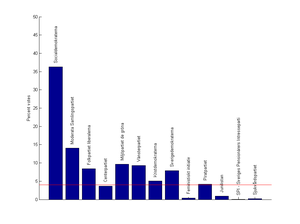May 05, 2009
Using Google to predict elections
 Last election I looked at the correlation between number of google hits for different Swedish political parties and the number of votes they got in the 2006 election. The correlation between log votes and log hits was surprisingly good, 0.9. Since the EU election is coming up I got the idea of using current google hits to predict the outcome.
Last election I looked at the correlation between number of google hits for different Swedish political parties and the number of votes they got in the 2006 election. The correlation between log votes and log hits was surprisingly good, 0.9. Since the EU election is coming up I got the idea of using current google hits to predict the outcome.
The prediction I got from correlating log votes with log hits on Swedish webpages (using only parties in the regression that got more than 10,000 votes in last national election) is:
| Social Democratic Party | 36.3% |
| Moderate Party | 14.1% |
| Green Party | 9.6% |
| Left Party | 9.3% |
| Liberal People's Party | 8.4% |
| Sweden Democrats | 7.7% |
| Christian Democrats | 5.0% |
| Pirate Party | 4.2% |
| Centre Party | 3.7% |
| June List | 0.9% |
| Feminist Initiativ | 0.4% |
So this prediction suggests that there is a real chance of the Pirate Party and Sweden Democrats getting more than 4% (and hence getting parliament seats), while the Center Party may fail to get them. The nationalist and crypto-xenophobic Sweden Democrats have a surprisingly high number of google hits - often from people critical of them. Conversely I'm surprised that the Internet-focused Pirate Party gets so few hits. The real test is of what is just online hot air is of course the number of votes they get.
This kind of study is of course very sensitive to how you search for the party names. In the EU election the June List got a lot of votes without a strong Internet presence. Worse, the correlation between the votes for parties in the 2004 EU election and the 2006 national election is just 0.2 (and just 0.13 between hits and votes). In the EU election the parliament parties got relatively similar number of votes, making a google-vote regression based on this data predict an absurdly even race where even minor parties like the retiree party and the healthcare party would get in with a comfortable margin. So this prediction should be taken more as statistical amusement than as a serious attempt at predicting anything.
Posted by Anders3 at May 5, 2009 10:44 PM